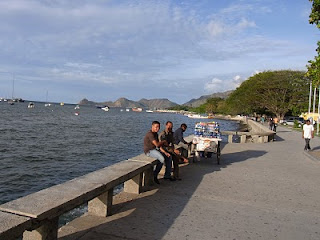 When out cycling around my Tokyo suburb I sometimes see a group of small children playing in the park with their teacher. Most of them look Japanese, but he looks European. And they all chatter away in English. They are from a pre-school popular not only with the small number of foreign parents in my locality but also with many Japanese who hope their kids will grow up to be bilingual.
When out cycling around my Tokyo suburb I sometimes see a group of small children playing in the park with their teacher. Most of them look Japanese, but he looks European. And they all chatter away in English. They are from a pre-school popular not only with the small number of foreign parents in my locality but also with many Japanese who hope their kids will grow up to be bilingual. It was not until this year that English classes were officially introduced into the Japanese elementary school curriculum, after many years of experiments and debate about whether this would mean too much work for children and teachers alike. But increasing numbers of parents are circumventing the standard education system by finding opportunities for their children to learn English. In 2006 it is estimated that 21% of Japan’s five-year-olds were taking private lessons. Are their parents’ expectations realistic?

Yuko, a Tokyo housewife who tries to teach her daughter basic English after she comes home from elementary school, feels Japan’s education system is in crisis and wants her child to have chances that she never had because of her own poor English - including the possibility of going to an overseas university. Doubts about Japanese higher education are growing as the decline in the birth-rate forces many universities to lower standards in order to compete for fewer and fewer students. But for Akiko, an elementary schoolteacher, Yuko’s views are unrealistic. Teaching English to young children means either increasing total classroom hours or reducing time spent on other subjects. And she worries that ability to read and write Japanese will decline.
Almost everyone knows of some child picking up two or more languages quite easily by being in a multilingual environment. But the evidence that young kids learn languages much more easily than older ones is not as clear as many people think. One of the strongest factors in language acquisition is the amount of exposure. It is rare for older children, let alone adults, to be able to immerse themselves in another language because they have so many activities in their lives. But if they did, perhaps they could learn quickly too.
Many other Asian countries have been much more enthusiastic about early English. In the major cities of China and Taiwan, children start the language from grade one, and those parents who can afford it have their kids in private English classes from much younger – a practice that is increasingly common in Saudi Arabia too, where state schools don’t offer English until age ten. In South Korea, where English starts in the third grade at state schools, 74% of children get a head start by taking private lessons in the 1st and 2nd grade. There are even English DVDs for babies. In a survey conducted by Park Yaku of Gyeonggi National University of Education, over a third of parents of 1st- and 2nd-graders said they spent $60 – 100 a month on these classes. Significantly, parents said they would be likely to spend even more on private English if the government carries out plans to introduce the language from the 1st grade. “It’s not that I’m so crazy about English,” one young father told me. “I just don’t have much choice. If I don’t send my son [to private English classes] he’ll fall behind the others.”























